#Saint Ambrose
Text
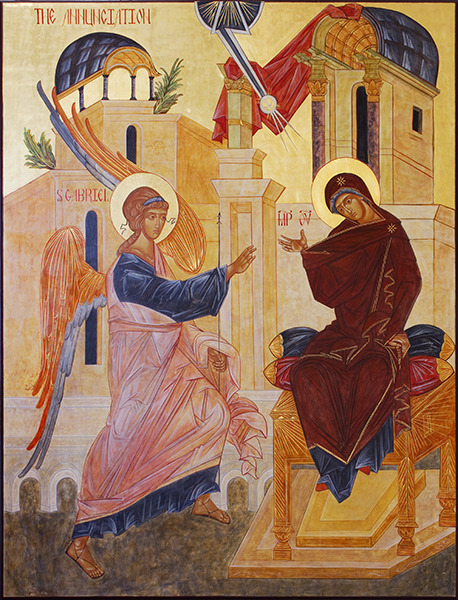
"Of all those born of women, there is not a single one who is perfectly holy, apart from the Lord Jesus Christ, who in a special new way of immaculate birthgiving, did not experience earthly taint." - Saint Ambrose, Commentary on Luke, Chapter 2.
10 notes
·
View notes
Text
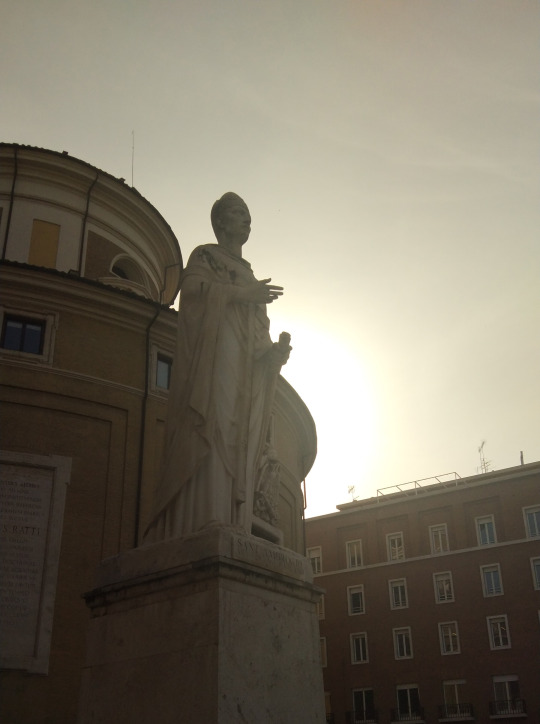
Basilica of Santi Ambrogio e Carlo al Corso, Rome.
#architecture#sculpture#santi ambrogio#saint ambrose#ambrose of milan#catholic church#photography#sunset#warm#summer#my stuff
13 notes
·
View notes
Text
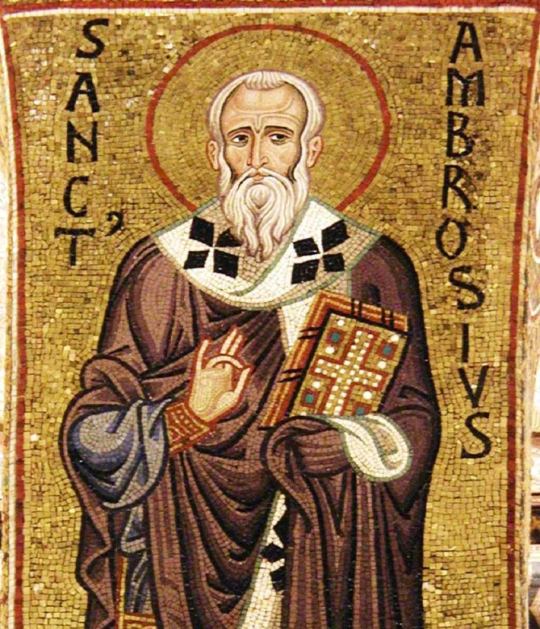
Non de tuo largiris pauperi sed de suo reddis. Quod enim commune est in omnium usum datum, tu solus usurpas. Omnium est terra, non divitum
You are not making a gift of what is yours to the poor man, but you are giving him back what is his. You have been appropriating things that are meant to be for the common use of everyone. The earth belongs to everyone, not to the rich.
—St Ambrose of Milan (Aurelius Ambrosius), De Nabuthæ, cap. xii, n. 53 (389 CE)
[Robert Scott Horton]
4 notes
·
View notes
Photo

But if these beings guard you, they do so because they have been summoned by your prayers.
- Saint Ambrose (340 – 397 AD)
Army Air Corps pilots were more than the British soldier’s eyes and ears - we were also our British soldier’s guardian angels. We watched over them and fought alongside them. When the going gets tough, the tough rely on close air support. Nothing but respect to our British boys on the battlefield. I doff my AAC ‘smurf hat’ to them. The best soldiers in the world.
32 notes
·
View notes
Text

St Ambrose barring Theodosius from Milan Cathedral
by Anthony van Dyck
The painting depicts the Roman emperor Theodosius I and his entourage being barred from Milan Cathedral by its archbishop Saint Ambrose, as punishment for the Massacre of Thessalonica
#baroque#history#art#painting#st ambrose#saint ambrose#theodosius#milan#cathedral#anthony van dyck#roman emperor#roman#emperor#theodosius i#archbishop#massacre#thessaloniki#thessalonica#massacre of thessalonica#architecture#europe#european#national gallery#london
42 notes
·
View notes
Text
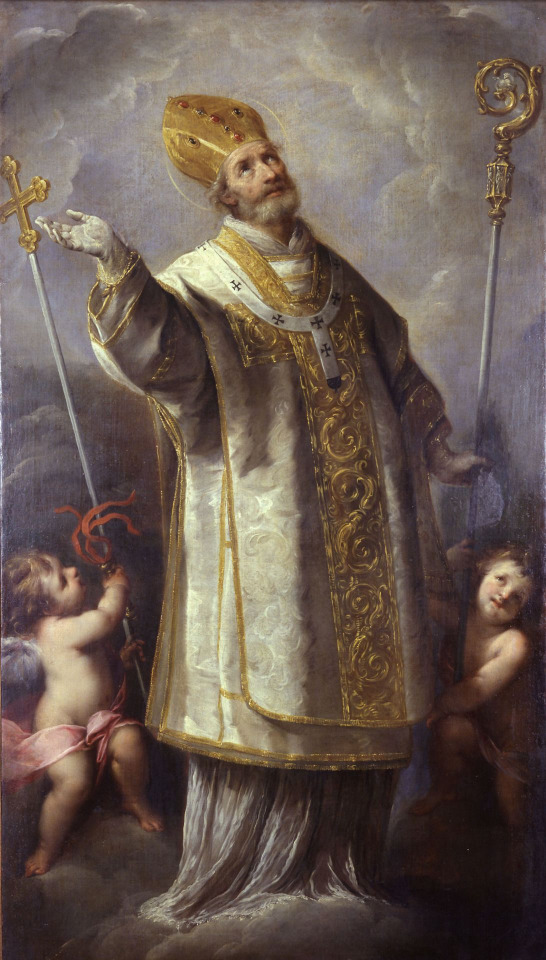
THE DESCRIPTION OF SAINT AMBROSE OF MILAN
Feast Day: December 7
"It is preferable to have a virgin mind than a virgin body. Each is good if each be possible; if it be not possible, let me be chaste, not to man but to God."
Like Augustine himself, the older Ambrose, born around 340, was a highly educated man who sought to harmonize Greek and Roman intellectual culture with the Catholic faith. Trained in literature, law, and rhetoric, he eventually became the governor of Liguria and Emilia, with headquarters at Milan. He manifested his intellectual gifts in defense of Christian doctrine even before his baptism.
While Ambrose was serving as governor, a bishop named Auxentius was leading the diocese. Although he was an excellent public speaker with a forceful personality, Auxentius also followed the heresy of Arius, which denied the divinity of Christ. Although the Council of Nicaea had reasserted the traditional teaching on Jesus' deity, many educated members of the Church – including, at one time, a majority of the world's bishops – looked to Arianism as a more sophisticated and cosmopolitan version of Christianity. Bishop Auxentius became notorious for forcing clergy throughout the region to accept Arian creeds.
At the time of Auxentius' death, Ambrose had not yet even been baptized. But his deep understanding and love of the traditional faith were already clear to the faithful of Milan. They considered him the most logical choice to succeed Auxentius, even though he was still just a catechumen. With the help of Emperor Valentinan II, who ruled the Western Roman Empire at the time, a mob of Milanese Catholics virtually forced Ambrose to become their bishop against his own will. Eight days after his baptism, Ambrose received episcopal consecration on Dec. 7, 374. The date would eventually become his liturgical feast.
Bishop Ambrose did not disappoint those who had clamored for his appointment and consecration. He began his ministry by giving everything he owned to the poor and to the Church. He looked to the writings of Greek theologians like St. Basil for help in explaining the Church's traditional teachings to the people during times of doctrinal confusion. Like the fathers of the Eastern Church, Ambrose drew from the intellectual reserves of pre-Christian philosophy and literature to make the faith more comprehensible to his hearers. This harmony of faith with other sources of knowledge served to attract, among others, the young professor Aurelius Augustinus – a man Ambrose taught and baptized, whom history knows as St. Augustine of Hippo.
Ambrose himself lived simply, wrote prolifically, and celebrated Mass each day. He found time to counsel an amazing range of public officials, pagan inquirers, confused Catholics and penitent sinners. His popularity, in fact, served to keep at bay those who would have preferred to force him from the diocese, including the Western Empress Justina and a group of her advisers, who sought to rid the West of adherence to the Nicene Creed, pushing instead for strict Arianism. Ambrose heroically refused her attempts to impose heretical bishops in Italy, along with her efforts to seize churches in the name of Arianism. Ambrose also displayed remarkable courage when he publicly denied communion to the Emperor Theodosius, who had ordered the massacre of 7,000 citizens in Thessalonica leading to his excommunication by Ambrose. The chastened emperor took Ambrose's rebuke to heart, publicly repenting of the massacre and doing penance for the murders. "Nor was there afterwards a day on which he did not grieve for his mistake," Ambrose himself noted when he spoke at the emperor's funeral.
The rebuke spurred a profound change in Emperor Theodosius. He reconciled himself with the Church and the bishop, who attended to the emperor on his deathbed. St. Ambrose died in 397. His 23 years of diligent service had turned a deeply troubled diocese into an exemplary outpost for the faith. His writings remained an important point of reference for the Church, well into the medieval era and beyond. St. Ambrose has been named one of the 'holy fathers' of the Church, whose teaching all bishops should 'in every way follow.'
Ambrose joins Augustine, Jerome, and Gregory the Great as one of the Latin Doctors of the Church.
#random stuff#catholic#catholic saints#ambrose of milan#san ambrocio#saint ambrose#beekeepers#candlemakers#doctor of the church
2 notes
·
View notes
Text
Happy feast of Saint Jerome to all y’all Saint Ambrose haters 😔😔😔
#catholicism#saint jerome#saint ambrose#they didn’t like each other#or at least Jerome didn’t like Ambrose#Idk what Ambrose though#t#haven’t read enough letters#😔😔😔
2 notes
·
View notes
Text
“I do not then discourage marriage, but recapitulate the advantages of holy virginity. This is the gift of few only, that is of all. And virginity itself cannot exist, unless it have some mode of coming into existence. I am comparing good��things with good things, that it may be clear which is the more excellent. Nor do I allege any opinion of my own, but I repeat that which the Holy Spirit spoke by the prophet: Blessed is the barren that is undefiled.”
St. Ambrose of Milan, Concerning Virgins
9 notes
·
View notes
Text
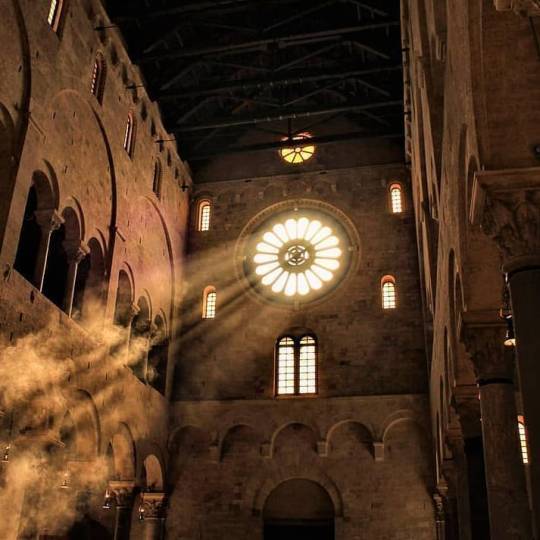
Cattedrale di San Sabino, Bari, Italy. Source of picture: clickfor_bari on Instagram
“The devil loves noise; Christ looks for silence.” St. Ambrose of Milan
#saint ambrose#quotes#The devil loves noise#noise#God#Jesus#Christ#Jesus Christ#Father#Son#Holy Spirit#Holy Trinity#christian religion#faith#hope#love#stress reliever
13 notes
·
View notes
Text
Happy Feast of Saint Ambrose!

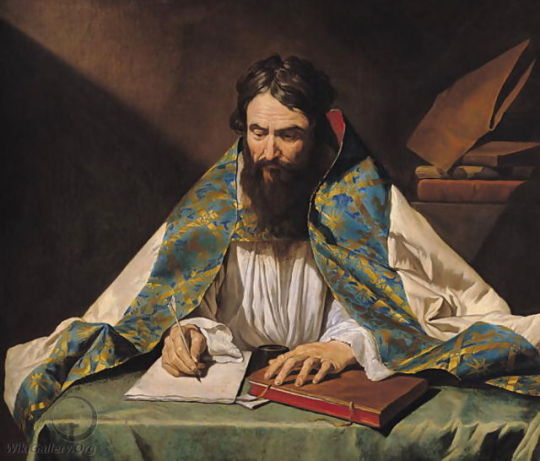
COME, Redeemer of the earth,
and manifest thy virgin-birth.
Let every age in wonder fall:
such birth befits the God of all.
Begotten of no human will
but of the Spirit, Thou art still
the Word of God in flesh arrayed,
the promised fruit to man displayed.
The Virgin’s womb that burden gained,
its virgin honor still unstained.
The banners there of virtue glow;
God in his temple dwells below.
Proceeding from His chamber free
that royal home of purity
a giant in twofold substance one,
rejoicing now His course to run.
O equal to the Father, Thou!
gird on Thy fleshly mantle now;
the weakness of our mortal state
with deathless might invigorate.
Thy cradle here shall glitter bright,
and darkness breathe a newer light
where endless faith shall shine serene
and twilight never intervene.
All praise, eternal Son, to Thee,
whose advent sets Thy people free,
whom, with the Father, we adore,
and Holy Ghost, for evermore. Amen.
-- St. Ambrose's Advent hymn on the Incarnation, as recorded by his student, St. Augustine.
5 notes
·
View notes
Text
Have a little fluff on the house—my Muse (as it were) is confused, poor dear, and needs a bit of a break...
203. Visitación
(nf) visitation
“Camilo,” says Félix, a smidgen of annoyance touching his voice, “what did we agree about you not impersonating religious figures?”
Saint Ambrose, standing by the pulpit and holding a candle, looks mildly offended.
“...honestly that’s not the reaction I expected.”
“Seriously, mijo, impersonating Padre Flores is one thing—”
“Um.”
“But an actual saint? He doesn’t even look right!”
“I beg your pardon?”
“I don’t even know where you got the idea from, he has a much better beard in the illustrations—”
“Señor de Madrigal, I think that’s going a bit too far!”
“Er...”
Félix blinks. Come to think of it, the voice does sound a little...ethereal. And for some reason it also sounds Latin.
...in his defence, it’s high noon and they’re in a church with shafts of light coming through the windows. You kind of miss the halo...
Uh oh.
“Santa María.”
“Again, not quite.”
#mild fluff#religious figures#poor Félix#encanto#fanfic#tiles on the roof#one shot collection#felix madrigal#camilo madrigal#saint ambrose#(because in TotR the town is San Ambrosio)#(for the patron saint of candles)#(I have been waiting *ages* to make this joke)
15 notes
·
View notes
Video
Today's #FragmentFriday is LJS 502, a late 11th-early 12th century fragment of Saint Ambrose's De mysteriis in protogothic script. Trimmed and used in a binding, the text on the verso side has been damaged by the use of an adhesive.
Online: bit.ly/3yqbO6d
#medieval#manuscript#fragment#saint ambrose#11th century#12th century#protogothic#binding#binding waste
16 notes
·
View notes
Photo

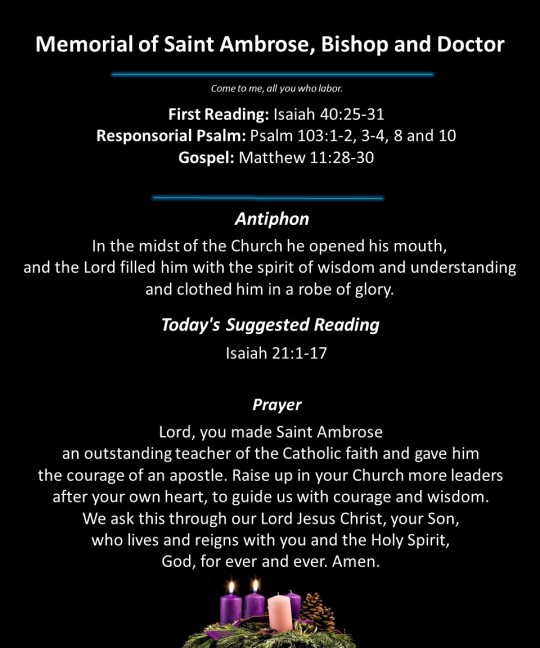
Today’s Reflection
Love is a fickle thing and it often produces extraordinary events such as a shepherd leaving ninety-nine sheep unprotected just to find one lost sheep. But is that not what God did, for God is in charge and he will do extraordinary things to bring one lost sheep back into the fold of ninety-nine sheep. In other words, God did the unexpected when he lowered himself to take on our flesh and as a result, he allowed himself to die upon a cross just to save us, his lost sheep. Thus, this ought to give us hope that when we return to God; that is repent, we know out of Love, God will rejoice, for out of love he does the unexpected, for us, his sheep.
Today’s Spiritual Links for December 07, 2022
Join the National Eucharistic Revival
Today’s Mass Readings
Today’s Reflection
The Holy Rosary
Liturgy of the Hours
New American Bible
Non-Scriptural Reading
Prime Matters
4 notes
·
View notes
Text
2023 AUGUST 14 Monday
"Individual propitiation or redemption, therefore, is not to seek, because the price of all is the blood of Christ, by which the Lord Jesus redeemed us, who alone reconciled the Father. He labored to the end, since he took upon himself our labors, as he says: “Come to me, all you who labor, and I will refresh you” (Mt 11,28)... We give nothing in return for our salvation because we have been washed, once for all, through the blood of Christ. But that does not mean we are dispensed from working hard to keep the precepts of life or can throw aside the Lord's commands. So long as we live we are striving and persevering so as to live eternally lest we die of death although already redeemed from death."
~ Saint Ambrose, Commentary on Psalm 48[49], 14-15 ; CSEL 64, 368
#bible#gospel#Psalms#psalm#further reading#Saint#Saint Ambrose#Ambrose#individual#propitiation#redemption#not#to seek#price#paid#blood#God#Lord#Jesus#Christ#return#salvation#washed#work hard#keep#precepts#life#commands#strive#persevere
1 note
·
View note
Text
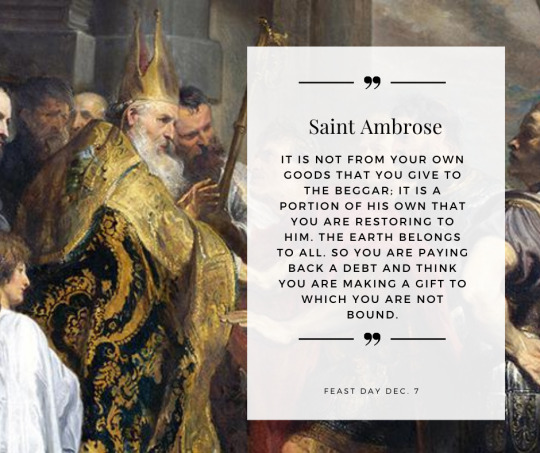
" It is not from your own goods that you give to the beggar; it is a portion of his own that you are restoring to him. The Earth belongs to all. So you are paying back a debt and think you are making a gift to which you are not bound."
Saint Ambrose
#It is not from your own goods that you give to the beggar; it is a portion of his own that you are restoring to him. The Earth belongs to al#Saint Ambrose#catholic saint quotes#catholic#saints#catholicism#christian quotes#catholic saints#god#jesus christ#tradcath#trad catholic#a#style#p#m#r
1 note
·
View note
Text
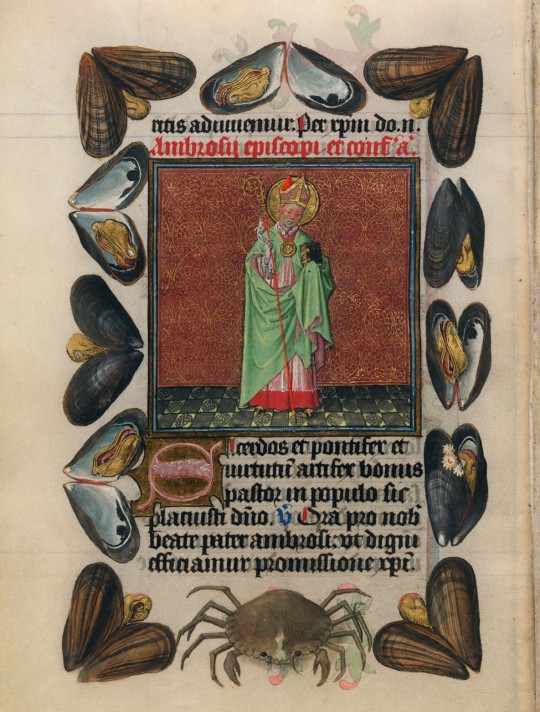
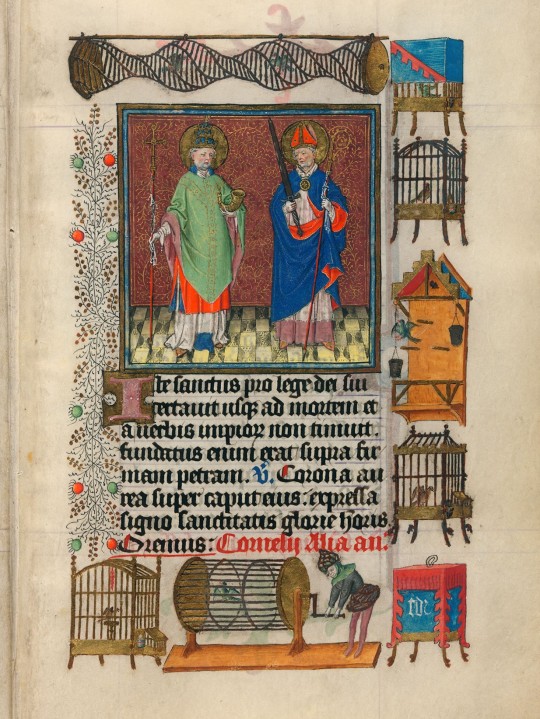
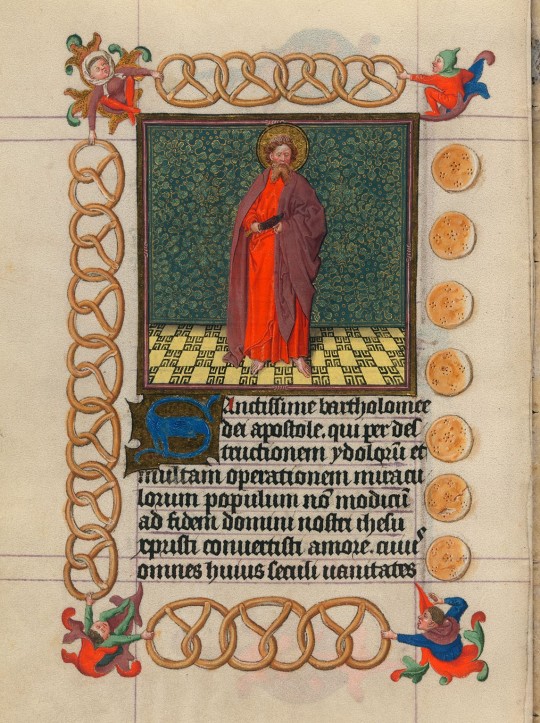
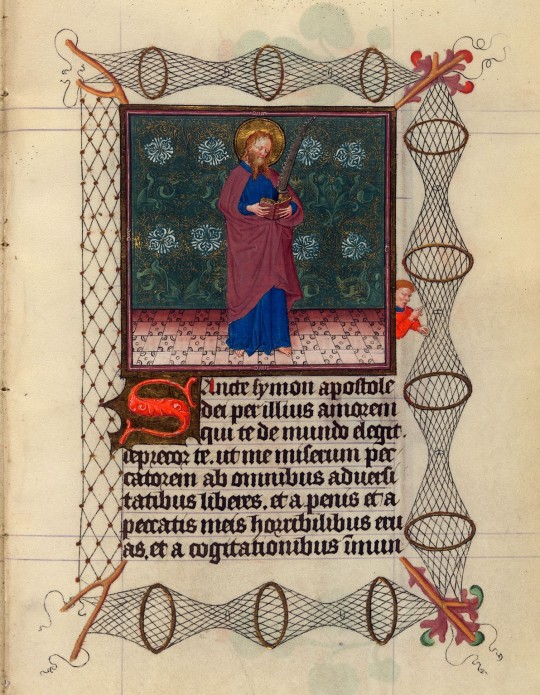
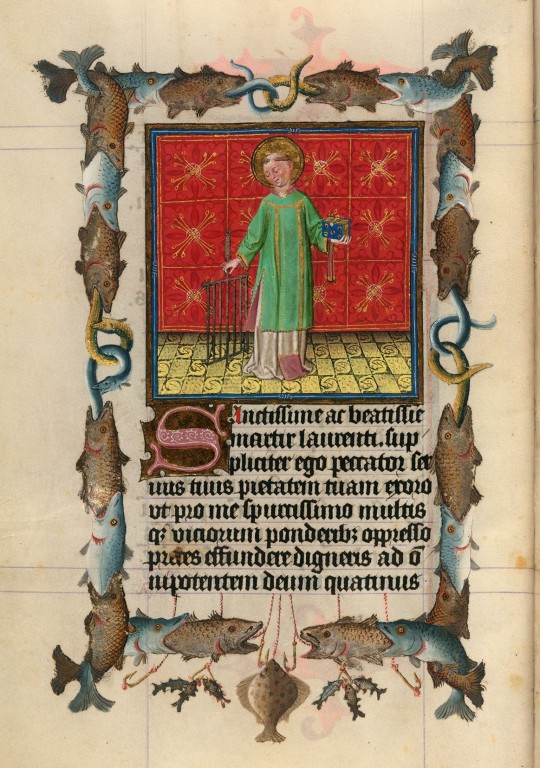
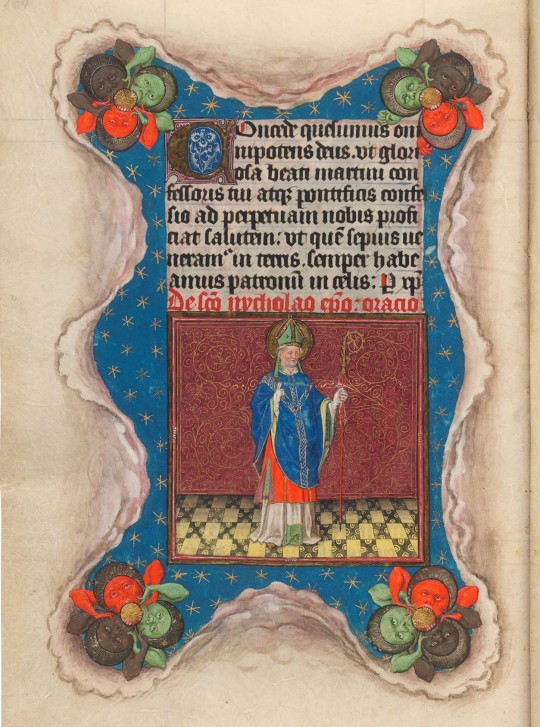
saints & fancy border decorations
in the hours of catherine of cleves, dutch, c. 1440
source: NYC, Morgan Library, MS M.917/945, pp. 228-280
#15th century#borders#the hours of catherine of cleves#catherine of cleves#the Master of Catherine of Cleves#saints#st. ambrose#st. cornelius#st. cyprian#st. bartholomew#st. simon#st. lawrence#st. nicholas#crabs#mussels#birdcages#pretzels#fishing#fish#illuminated manuscripts
452 notes
·
View notes